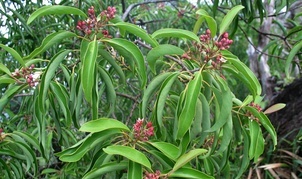Amyris
From Wikiwel
Other Names : Amyris balsamifera, Amyris elemifera, Torchwood, West Indian sandalwood, West Indian rosewood.
Special Precautions of Amyris
- There are very few side effects of amyris essential, but you may experience skin irritation, stomach upset, or specific complications if you are dealing with certain medical conditions or are on certain medications.
- Chronic Disease – Experts do not recommend using amyris essential oil if you have a terminal illness, cancer, epilepsy or a number of other conditions. Speak to your doctor if you have any pre-existing conditions or prescriptions that might complicate your use of this essential oil.
- Skin Irritation – As with many essential oils, amyris essential oil could result in skin irritation, particularly in those with sensitive skin. Apply a small amount to a patch of skin and wait 2-3 hours for any reaction before using it on a larger scale.
- Ingestion : Amyris oil is not intended for oral ingestion. There is no reason to ever consume this essential oil, as it can cause severe stomach upset, nausea or vomiting. Using this oil in a diffuser will provide all the internal effects you require.
- Pregnancy – If pregnant or breast-feeding, it is best not to use this essential oil, although in aromatherapy or diffuser applications, it can be considered safe. Before using this oil in any form, speak to your doctor about your particular condition.
- See Precautions Aromatherapy.
Health Benefits and uses of Amyris
Amyris is antiseptic, balsamic, decongestant, emollient, muscle relaxant, sedative, and useful to soothe and soften dry, irritated skin.
- Insomnia: This essential oil is a well known sleep aid for people who struggle with insomnia and restless sleep. By using a steam inhaler or oil diffuser before bed, you can calm your mind and ease the tension in your muscles, helping the body relax enough to fall into a deep, uninterrupted sleep, followed by a refreshed feeling in the morning.
- Respiratory Conditions: Amyris essential oil has certain antibacterial and antiseptic properties that can help eliminate respiratory infections. The anti-inflammatory nature of this oil can also help to soothe the respiratory tracts and eliminate sore throats, while also cutting through congestion, phlegm and mucus. This will not only treat the symptoms of respiratory conditions, but also address the underlying pathogen causing the infection.
- Immune System: Protection against pathogens, bacteria, viruses and fungi are critical uses for essential oils, both internally and externally. The antioxidants found in this essential oil, as well as the immune-boosting compounds and chemicals, can reduce the strain on your immune system and help your body function more effectively.
- Antioxidants: Valerianol and the three types of eudesmol found in amyris essential oil all help to cut down on oxidative stress within the body, which can cause mutations in healthy cells and promote the onset of chronic disease, including cancer. Antioxidants are also excellent for skin health, as they can not only prevent inflammation and irritation, but also wrinkles and signs of premature aging. This can add elasticity to your skin, helping to make you look younger for longer! The various emollient properties of amyris essential oil can also smooth the skin and improve texture and glow.
- Brain Boost: Studies have linked the active ingredients in amyris essential oil to a cognitive boost, particularly for those with neurodegenerative disease, poor memories, dementia and other signs of weakening cognition. The uplifting scent, when inhaled, can be a stimulant for neural pathways and increase focus, concentration and retention.
- Detoxify the Body: By stimulating perspiration, urination and the digestive system, this essential oil can help to lower the toxicity levels in the body. This can be from food, the environment, medication or poor lifestyle habits, but the quicker your body can cleanse itself, the sooner it can get back to operating at 100%. Diffusing this oil throughout your home is a great way to gradually detoxify your life and your home.
- Used in massage oil or a bath it can ease sore and tired muscles.
- Stress and Anxiety: The various aromatic compounds found in amyris oil, in combination with the antioxidants and other active compounds, are able to affect and impact the limbic system (emotional center of the brain). This can result in a waterfall of different neurotransmitters that can improve mood and relieve you of anxiety. This is also why so many people use this oil in a room diffuser, to provide calming vibes and positive energy all day long.
- Diffused it can calm the mind and is often used in meditative blends.
- It is beneficial for helping calm your mind and muscle relaxation, as well as minimizing stress and tension and releasing anxiety.
- helps in improving mental clarity and makes you feel at peace.
- the essential oil works great in skin regeneration and helps slow down aging.
- It has a cooling property that assists in relieving irritability, frustration, and sexual tension.
- Amyris oil is a great choice among poets, artists, and musicians as it helps improve creativity and imagination.
- Insect Repellent: One of the popular and traditional uses of amyris essential oil is as an insect repellent. Mosquitoes, gnats and biting flies find the aroma extremely unpleasant, so when this oil is included in candles, potpourri, diffusers or homemade insect repellents, it can keep you safe from annoying bites, as well as the potential diseases that those mosquitoes can carry.
- Room Cleanser: Antibacterial and antiseptic qualities of this essential oil make it a popular addition to cleaning solutions for surfaces in your home. Add a few drops to a dust rag and improve not only the long-term protection against pathogens and germs, but also improve the aroma of your home. General diffusion of this oil is also a great way to neutralize airborne pathogens and provide a shield against foul odors.
References
- http://www.sciencedirect.com/science/article/pii/S0031942200978853
- https://www.researchgate.net/publication/215800523
- http://www.sciencedirect.com/science/article/pii/S0378874103003982
- https://link.springer.com/article/10.1007/s00436-006-0184-1
- http://www.sciencedirect.com/science/article/pii/S0278691507004541
- http://www.tandfonline.com/doi/abs/10.1300/J044v12n03_04
- http://www.sciencedirect.com/science/article/pii/S0031942200914882
- http://www.eolss.net/Sample-Chapters/C17/E6-58-10-02.pdf
